Camostat Mesylate: A Potential COVID-19 Treatment
SARS-CoV-2: A Novel Coronavirus
The novel coronavirus SARS-CoV-2 (Severe Acute Respiratory Syndrome Coronavirus-2) was first reported in December 2019 in Wuhan, China and since then it has spread throughout the world. The World Health Organization (WHO) declared COVID-19 a pandemic in March 2020 as it seems to be very contagious and a serious public health risk.
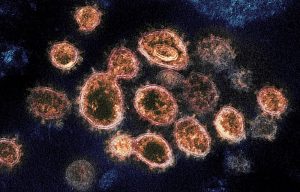
This transmission electron microscope image shows SARS-CoV-2, the virus that causes COVID-19, isolated from a patient in the U.S. Virus particles are shown emerging from the surface of cells cultured in the lab. The spikes on the outer edge of the virus particles give coronaviruses their name, crown-like. Credit: NIAID-RML
SARS-CoV-2 belongs to the broad family of coronaviruses and causes a respiratory disease called COVID-19. It is a positive single- stranded RNA virus with a crown-like structure because of the spike glycoproteins on its envelope.
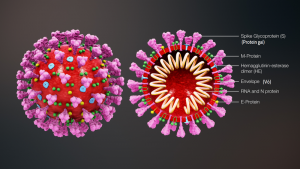
This is a 3D medical illustration of 2019 Novel Coronavirus, derived from a CDC released image. It explains the ultrastructural morphology. This virus has four surface proteins E,S,M & HE labelled in the image. The S protein gives the crown-like appearance, for which the virus is named. The cross-section shows the inner components of the virus. (https://www.scientificanimations.com / CC BY-SA (https://creativecommons.org/licenses/by-sa/4.0)
A new study and a potential drug candidate
Recently a research group from Germany examined the mechanisms that SARS-CoV-2 is using to target and enter the human cells and how this process can be blocked. Their study, published in the journal Cell, showed that the new coronavirus uses its spike proteins to attach to the angiotensin converting enzyme II (ACE-2), a cell entry receptor1. Then, the virus activates the cellular serine protease TMPRSS2, expressed on the epithelial cells of human lungs. This protease primes S protein in order to complete entry into the cells2. Blocking TMPRSS2 activity with camostat mesylate, a protease inhibitor, can prevent virus to enter the cells and avoid infection3.
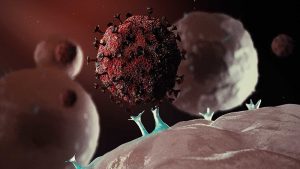
SARS-CoV-2 illustration
What is Camostat mesylate?
Camostat mesylate is a serine protease inhibitor that was first approved in Japan for the treatment of chronic pancreatitis and postoperative reflux esophagitis. It has been also used in some cancer treatments, against viral infections and as a fibrosis inhibitor in liver and kidney disease.
A previous study in 2012 demonstrated that camostat partially blocked infection by SARS- CoV and human coronavirus NL63 in HeLa cells and suggested camostat mesylate as a potential antiviral drug to prevent infection. The new coronavirus is genetically related to the previous coronaviruses and scientists can utilize older scientific data and results in fight against COVID-19.
There is currently no treatment or vaccine for COVID-19 but a global community of researchers are working hard to understand the novel coronavirus and find potential treatments.
StressMarq Biosciences recently launched Camostat mesylate (catalog#SIH-585) for COVID-19 research.
REFERENCES
- Angiotensin-converting enzyme 2 is a functional receptor for the SARS coronavirus. Li W. et al. (2003) Nature. 426(6965):450–454.
- Evidence that TMPRSS2 activates the severe acute respiratory syndrome coronavirus spike protein for membrane fusion and reduces viral control by the humoral immune response. Glowacka I. et al. (2011) J Virol 85: 4122-4134.
- Simultaneous Treatment of Human Bronchial Epithelial Cells with Serine and Cysteine Protease Inhibitors Prevents Severe Acute Respiratory Syndrome Coronavirus Entry. Kawase M. et al. (2012) J Virol. 86(12): 6537-6545.

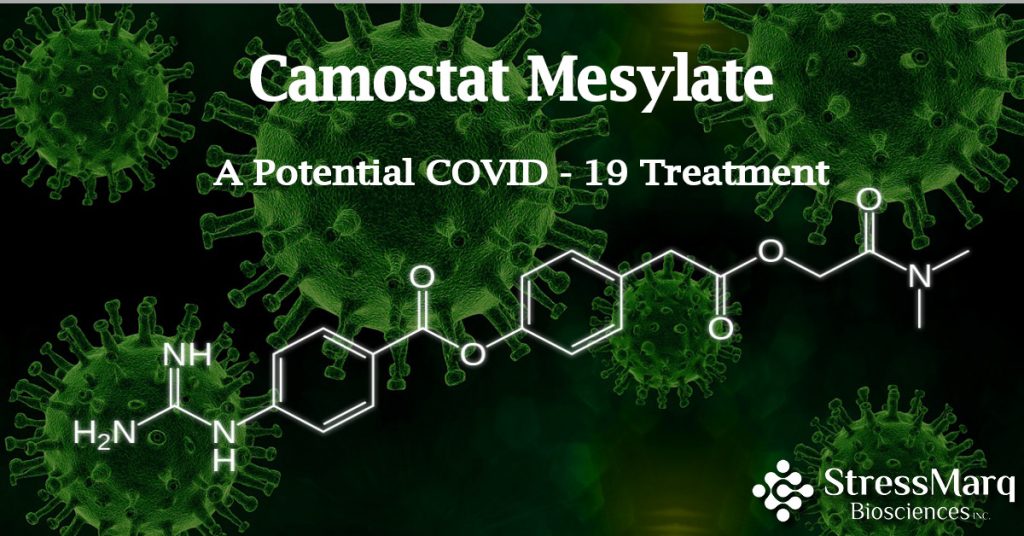
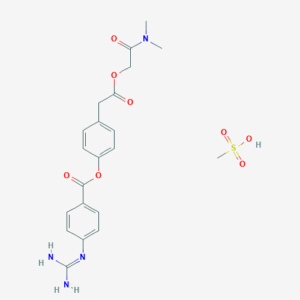
Leave a Reply